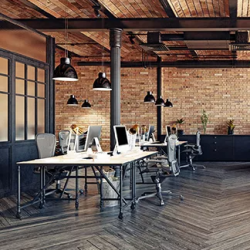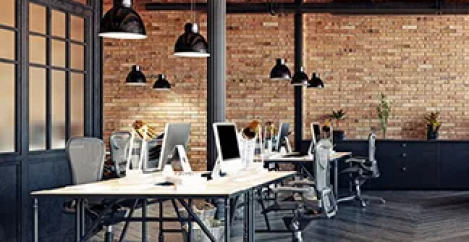November 17, 2020
Unused office space could cost London businesses almost £13 billion
 Unused office space after coronavirus could cost London-based businesses almost £13 billion according to a new report by Space Three Two, a new office timeshare marketplace born out of lockdown. According to a survey of London office workers, employees want to spend an average of 2.7 days back in the office once all Covid-19 restrictions have been lifted. 1 in 10 workers said didn’t want to go back to the office at all.
Unused office space after coronavirus could cost London-based businesses almost £13 billion according to a new report by Space Three Two, a new office timeshare marketplace born out of lockdown. According to a survey of London office workers, employees want to spend an average of 2.7 days back in the office once all Covid-19 restrictions have been lifted. 1 in 10 workers said didn’t want to go back to the office at all.
The total London commercial rental market according to CoStar is worth an approximate £17.9 billion. Prior to coronavirus, office workers spent an average of 4.2 days a week in the office. If this drops to an average of 2.7 days after coronavirus, the utilisation rate per office (e.g. the percentage of time that desks in any given office is in use), would drop from 44 percent pre-Covid to 28 percent post-Covid.
Insights from the report suggest London offices are only using desks 28 percent of the time, equating to a 72 percent rate of wastage. As a result, unused desks could cost businesses £12.84 billion in total. This means 72 percent of all office rent paid by businesses in London would be spent on empty desks.
The figures come as Space Three Two announces the signature of the first-ever office timeshare agreement between Pod Talent and The Hive, both independent recruitment businesses based in London.
The Hive will move into Pod’s existing office in Old Street for two days each week whilst Pod retain the three remaining days. Pod will reduce their office costs by 40 percent, while The Hive will reduce their office costs by 60 percent with no need for a fit out. Energy consumption is also estimated to reduce by 35-40 percent between the two companies.
Office timeshare
Analysing office rental data from commercial real estate information company, Costar, along with pre-Covid-19 utilisation rates provided by The British Council for Offices, claims that a combination of factors could be about to lead to a seismic shift in the way that the commercial property sector functions.
The study suggests that London businesses are currently carrying unnecessary, unsustainable costs which look to have the potential to devastate the profitability of thousands of businesses across the capital. It is this combined financial and logistical challenge that has led to the emergence of this brand-new category of office timeshare.
Office timeshare is where two businesses share a single office on different days of the working week. Businesses are able to specify days where they have exclusive use of the space with their timeshare partner, with both parties benefitting from the reduced cost of office rental fees.
London Office Sublease Availability Jumps to 15-Year High
As the pressure of the pandemic takes hold, companies are releasing excess stock onto the sub-lease market in an attempt to protect themselves from the pending liability of office space. As a result, London office sublease availability has jumped to a 15-year high. It is these businesses that stand to benefit from the emerging office timeshare category, due to the changing behaviours of office-based employees, plus workforce downsizing.
Many businesses will also have an eye on the need to repay a VAT deferral from March next year. An office timeshare marketplace like Space Three Two enables thousands of businesses across London to make major, immediate savings that will help them offset this imminent cost, which will be a key consideration for many as they plan their 2021 finances.
Seven out of 10 desks to sit empty in traditional offices post-Covid
The changing nature of the workplace has been evident for a number of years; exacerbated now due to Covid – “Most notably, we have seen the spread of ‘agile working’: technology-enabled workstyles, typified by a high degree of choice and mobility; using a variety of work settings and workplaces, depending on tasks and preferences.” (‘Office Occupancy: Density and Utilisation’, The British Council for Offices, February 2018).
“London businesses will be spending a combined £12bn on office space that they do not need once Covid-19 restrictions are lifted”, says Jon Dweck, founder of Space Three Two.
“Desk utilisation was already a major issue pre-Covid, with more than 50 percent of all desks empty at any given moment. Post-Covid, due to changing working practices and reduced workforces, we can expect 7/10 of all office desks to be empty at any given time.
[perfectpullquote align=”right” bordertop=”false” cite=”” link=”” color=”” class=”” size=””]”Office timeshare, or the ability to share office space with another firm of a similar size, is the future of workplaces.”[/perfectpullquote]
“This is the tip of the iceberg. These figures paint a damning picture for London-based firms but we expect to see similar trends across the UK. The pandemic has caused a long-lasting seismic shift in people’s working habits. People want to spend less time commuting and more time at home, but unused office space is an expensive challenge for businesses. Office timeshare, or the ability to share office space with another firm of a similar size, is the future of workplaces.”
Jon Dweck, CEO and founder of Space Three Two, also comments on the signing of the UK’s first office timeshare agreement: “Signing the UK’s first office timeshare agreement is a significant step in the future of workplaces. Covid-19 has made a long-lasting change on the way we work and we know that after lockdown, and once social distancing has ended, the majority of businesses don’t want to return to the office five days a week as before. But empty offices are an expensive problem for businesses.
“For every business tied into a long-lease that they cannot get out of, there is a business able to seek a new part-time office. Connecting them together is the ideal solution and a sign of things to come. Timesharing your office for two or three days a week with another like-minded business of similar shape and size, will not only save on costs but dramatically reduce energy consumption and time spent commuting, permanently. Both businesses have a space to call their own on the days they need it, generating substantial savings without rotating staff. It’s a win-win for everyone involved and we expect to see many more businesses looking to this approach after lockdown.”













